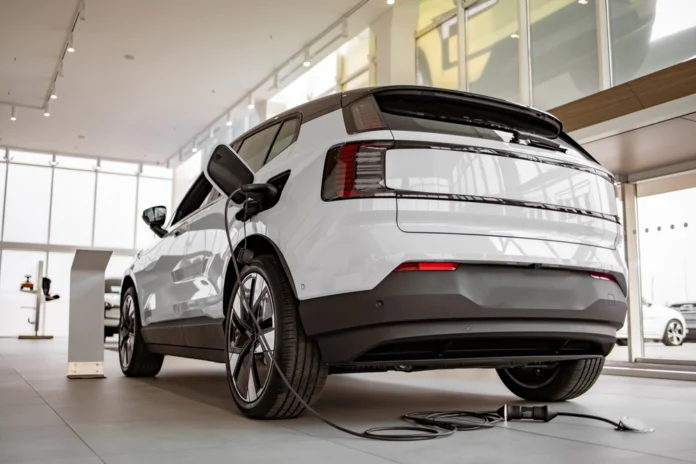Compact electric SUVs are gaining popularity due to their practicality, advanced technology, and commitment to sustainability. With sleek designs, customizable features, and spacious interiors, they meet diverse consumer needs. The competitive terrain offers various models, appealing to buyers seeking performance or efficiency. Economic incentives, like federal tax credits, further encourage adoption. Moreover, emerging global markets are witnessing exponential growth, making electric SUVs increasingly relevant. This trend reflects a broader shift towards sustainable transportation options for the future, where people will plunge into the world of electric vehicles, and in addition, the scenic view of the automotive industry is changing.
Highlights
- Compact electric SUVs offer a balance of performance, efficiency, and practicality, appealing to diverse consumer needs.
- Innovative designs and advanced technology features enhance user experiences, attracting tech-savvy buyers.
- Economic incentives, such as tax credits, make electric SUVs more affordable for consumers, increasing their desirability.
- Environmental benefits, including zero tailpipe emissions and sustainability, resonate with consumers prioritizing eco-friendly options.
- The growing market presence of established brands provides varied model availability, boosting consumer confidence and interest in electric SUVs.
The Rise of Compact Electric SUVs in the Market
As environmental concerns and economic factors converge, the rise of compact electric SUVs has reshaped the automotive scenery, positioning these vehicles as front-runners in the global electric market. Market analysis indicates that compact electric SUVs dominated 53.98% of the segment in 2023, with popular models like the Hyundai IONIQ 5 and Ford Mustang Mach-E leading sales. This shift in consumer behavior reflects a growing preference for low-pollution alternatives that prioritize affordability and practicality for daily use. Projected market growth rates of 31.9% to 32.06% through 2034 further highlight the increasing demand for these vehicles. Their compact design not only aligns with urban lifestyles but also meets the call for sustainability, making them essential in the developing automotive scenery. Additionally, the global electric SUV market is anticipated to reach around USD 11,953.03 billion by 2034, underscoring their expanding influence in the industry. As Tesla remains the dominant player with 46% market share in the U.S., the momentum for compact electric SUVs continues to build amidst growing competition. In fact, the Chevrolet Equinox EV has recently become the bestselling non-Tesla compact electric SUV, reflecting its growing popularity.
Design Trends Shaping Consumer Preferences
The evolution of design trends in compact electric SUVs substantially influences consumer preferences, reflecting both aesthetic appeal and functional innovation. Modern models emphasize angular lines and sharp edges, merging futuristic design with retro elements that evoke nostalgia. Sustainable technology plays a crucial role, with automakers integrating recycled materials and prioritizing carbon-neutral production, thereby appealing to eco-conscious buyers. Customizable features, such as AR displays and adaptable interiors, enhance user experiences, while functional aesthetics like wellness upgrades and innovative storage solutions resonate with diverse lifestyles. This blend of style, functionality, and sustainability positions electric vehicles as not just modes of transport, but as meaningful investments for consumers who value both community and environmental stewardship, and take a plunge into eco-friendly options, where eco-awareness is crucial. Additionally, advancements in 800V batteries enable ultra-fast charging, which further enhances the practicality of compact electric SUVs for daily driving. Notably, the 2025 Genesis Electrified GV70 ranks as #1 in Best Electric SUVs under $75,000, underscoring the appeal of affordability without sacrificing luxury. As consumers look for longer ranges in their vehicles, the upcoming 400-mile electric crossover from Chrysler is poised to attract those seeking efficiency without compromise.
The Competitive Edge of Varied Model Availability
Varied model availability enhances the competitive scenery of compact electric SUVs, catering to a wide array of consumer preferences and needs. This abundance of model variety and brand diversity enables buyers to select vehicles that align with both their lifestyle requirements and price points. From the high-performance Hyundai Ioniq 5 N to the budget-friendly Kia EV6, consumers are met with options that range from exhilarating performance to exceptional efficiency. Additionally, electric SUVs like the Ford Mustang Mach-E and the Volkswagen ID.4 exemplify how modern technology and user-centric design can meet practical demands. As brands continue to innovate, the expanding lineup of diverse models solidifies the compact electric SUV market as an appealing choice for a growing community of environmentally conscious drivers who are ready to plunge into the world of eco-friendly vehicles. The 2025 Chevrolet Equinox EV stands out as the cheapest electric SUV, starting at $34,995, attracting budget-conscious consumers looking to make the switch to electric. With an EPA-rated range of 307-319 miles, this model also offers impressive mileage for its price point. Furthermore, many models such as the Kia EV3 offer an attractive entry price and long-range capabilities, catering to both affordability and convenience.
Economic Incentives Driving Adoption
While economic incentives play a crucial role in steering consumer decisions, the terrain of compact electric SUVs is substantially shaped by the federal tax credit structure. With a $7,500 credit contingent on battery component sourcing and North American assembly, these tax credits substantially influence market trends. Consumers are drawn to models priced between $55,000 and $80,000, ensuring eligibility while benefiting from long-term incentives extended through 2032. The phased re-eligibility of established manufacturers like GM and Tesla further stimulates interest in their electric products. Enhanced point-of-sale credit implementations promise to streamline access to these benefits, nurturing a supportive environment for prospective buyers keen to engage with sustainable transportation while also belonging to an eco-conscious community. Qualifying EVs must have a battery size of at least 7 kWh, creating an additional layer of appeal for consumers considering their investment in electric vehicles. Additionally, vehicle assembly location plays a vital role in determining tax credit eligibility, highlighting the importance of North American manufacturing in the electric vehicle market. The growing selection of budget-friendly EV SUVs allows consumers to access electric options at more competitive prices, further driving the appeal of this segment.
Shifts in U.S. Market Dynamics
Shifts in U.S. market trends for compact electric SUVs reflect a complex interplay of consumer preferences, competitive pressures, and regulatory changes. As U.S. EV market share slightly declined to 7.4% in Q2 2025, consumer behavior shifted toward affordable compact SUVs, which accounted for a significant share of electric SUV revenue. Traditional automakers like GM doubled their EV sales, demonstrating a commitment to meet changing consumer demands. Meanwhile, Tesla faces mounting competition as brands like Ford and Hyundai enhance their products. With expiring federal tax credits influencing purchasing urgency, the market dynamics are reshaping. Interestingly, the overall electric car sales in the U.S. increased to 1.6 million in 2024, showcasing a broader trend towards electrification despite market fluctuations for compact SUVs.
Tighter competition in the compact SUV segment nurtures brand loyalty and adapts consumer expectations, ensuring the relevance of electric SUVs in an increasingly diverse market scenery, but to fully thrive, companies must be prepared to take a plunge, operate in a vibrant, adaptive environment, provide their services, and navigate a transforming scenery that is constantly developing.
Global Sales Trends and Emerging Markets
The compact electric SUV market is experiencing significant growth, fueled by increasing global demand and emerging markets that are beginning to adopt electric vehicle technology. Current market analysis reveals that electric SUV sales are projected to reach $11.95 trillion by 2034, with an exceptional CAGR of 32.06% from 2025. Particularly, regions such as North America and Europe are leading this global expansion, driven by rising incomes and environmental awareness. In emerging markets like Brazil, India, and Vietnam, sales are surging, with increases of 40%, 45%, and nearly 400% year-over-year, respectively. China accounts for nearly two-thirds of global EV sales, illustrating the immense potential for compact electric SUVs in markets across the globe. Additionally, the high growth rate of 24.1% in the Chinese market demonstrates a strong consumer interest in electric vehicles, highlighting the urgency for manufacturers to innovate and cater to these evolving demands. Furthermore, it is essential to consider that global BEV sales grew by 42% year-on-year in Q1 2025, indicating a robust shift toward electric mobility.
To capture these opportunities, manufacturers are focusing on affordability and localized production, ensuring that compact electric SUVs meet the diverse needs of new consumers worldwide, poised to plunge into this burgeoning market with a striking presence.
Practicality as a Key Consumer Demand
As compact electric SUVs continue to capture the attention of consumers, practicality has emerged as a vital factor driving purchasing decisions. With urban planning priorities shifting towards sustainable options, these vehicles offer exceptional cost efficiency in daily commuting. Lower maintenance costs and the potential for significant fuel savings make them appealing to budget-conscious buyers. Moreover, spacious interiors and flexible seating configurations cater to families while providing ample cargo capacity for recreational needs. Their compact dimensions enhance maneuverability in crowded city settings, facilitating easier parking. Additionally, the simplicity of electric drivetrains results in fewer service requirements, further solidifying their practicality for modern lifestyles. This combination of factors makes compact electric SUVs a relatable choice for consumers seeking convenience and adaptability. Furthermore, electric SUVs are cheaper to maintain due to their fewer parts and reduced need for frequent servicing. Additionally, they produce zero tailpipe emissions, highlighting their commitment to environmental sustainability. This growing popularity is fueled by their advanced technology features which enhance the driving experience and appeal to tech-savvy consumers.
Conclusion
To summarize, the growing popularity of compact electric SUVs is a response to changing consumer preferences, driven by design trends, competitive model availability, and economic incentives. As market dynamics shift in the U.S. and globally, these vehicles are increasingly seen as practical choices for environmentally conscious consumers. The versatility and efficiency of compact electric SUVs position them favorably in the automotive scenery, suggesting that their ascent will continue as demand for sustainable transportation options rises.
References
- https://www.caranddriver.com/news/g64540955/bestselling-evs-2025/
- https://www.iea.org/reports/global-ev-outlook-2025/trends-in-electric-car-markets-2
- https://caredge.com/guides/electric-vehicle-market-share-and-sales
- https://evxl.co/2025/06/27/electric-vehicle-sales-poised-for-growth/
- https://www.coxautoinc.com/wp-content/uploads/2025/04/Q1-2025-Kelley-Blue-Book-EV-Sales-Report-04-11-25.pdf
- https://www.grandviewresearch.com/industry-analysis/electric-suv-market-report
- https://www.precedenceresearch.com/electric-suv-market
- https://www.youtube.com/watch?v=DMhoWw7v2-I
- https://www.go-electra.com/en/newsroom/electric-vehicle-2025/
- https://www.caranddriver.com/rankings/best-suvs/electric/luxury-compact


